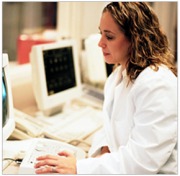
A practice’s EMR has all the medical and treatment history of its patients and contains doctor’s notes, test results, medications, and other important information. Medical transcription helps EMR adoption as transcription helps converts all dictated information into electronic format.
How Medical Transcription Helps Transition to EMR
Medical transcriptionists can and must play an important role in helping the transition to a national electronic medical record system. This was pointed out the recently published Speech Recognition Adoption White Paper authored by the MTIA (Medical Transcription Industry Association) and AHDI (Association for Healthcare Documentation Integrity).
Many physicians may find it difficult to deal with new EMR technologies. In this case, the role of the medical transcription would become very significant in helping to resolve the challenges associated with the current EMR adoption.
• Dictation is the preferred choice by most doctors. With medical transcription services, they don’t have to change their dictation habits. Medical transcriptionists can provide accurate speech-to-text translation.
• It involves less time and cost to dictate a patient note than to enter the encounter directly into the EMR.
• Expert medical transcriptionists can provide results in quick turnaround time. This is especially important for specialties like radiology.
• Outsourcing can ensure top level accuracy as stringent QA is an integral part of the transcription services provided by reliable medical transcription companies.
• EMR technologies can slow down the documentation process, as the physician manually enters the data into the computer. In some, the physician has to enter clinical notes by clicking drop-down menus. This can take time and even affect physician-patient interaction. More time spent for entering information into the EMR would also mean that only fewer patients can be seen.
Advanced EMR applications include a whole range sophisticated features such as built in voice recognition software. However, such voice recognition software has several limitations, such as a limited vocabulary and inability to identify spoken words. This can lead to a lot of errors in the text transcript. This makes the services of a medical transcriber very important. A trained, professional medical transcriber can easily identify and understand physician dictations to provide highly accurate transcripts.
Integrating EMR Applications with Medical Transcription
Medical transcription plays a significant role in documentation as well as in helping solve the challenges associated with EMR adoption. Reputable medical transcription companies stay ahead by adopting new technologies to meet the changing needs of the healthcare industry. This allows EMR adoption process with services such as structured dictation, HL7 interface and structured transcription. Established medical transcription companies have started ensuring connectivity and integration with the EMR the medical facility subscribes to. They can provide integration with whole range EMR applications, including specialty specific EMR applications.
The blending of EMR with medical transcription outsourcing allows healthcare practitioners to meet federal regulations as well as conducting their day-to-day activities with greater efficacy, improve productivity and provide better patient care. With the right transcription company, physicians can continue to dictate and get their clinical notes into their EMR smoothly and quickly.




 RSS Feed
RSS Feed